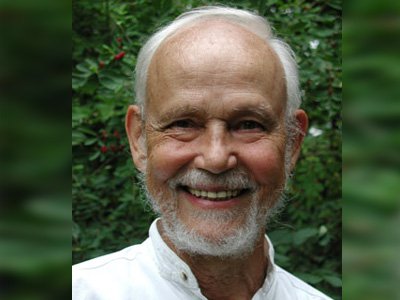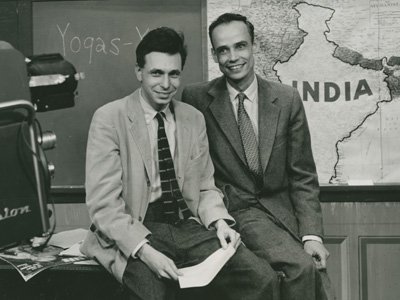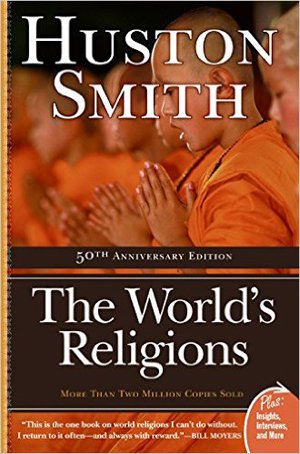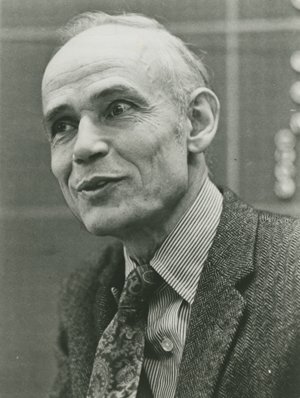Former Syracuse Religion Scholar Huston Smith Mourned
Smith remembered for inclusive view of sacred traditions

Ten years after the renowned religion scholar Huston Smith left Syracuse University’s Department of Religion, he updated his popular book “The Religions of Man” (1958) to include a chapter on indigenous traditions. Smith, who died Dec. 30 at age 97, thanked members of the Onondaga Nation for opening his eyes.
It was only through visits with then-Onondaga Chief Leon Shenandoah and Onondaga faith keeper Oren Lyons ’58, H’93 that he understood “the significance of this totally new area of world religions,” Smith wrote in “A Seat at the Table: Huston Smith in Conversation with Native Americans on Religious Freedom” (University of California Press, 2006).
Smith described a visit to the Onondaga Nation during which he met leaders of the Six Nations of the Iroquois Confederacy (the Haudenosaunee). When the official meeting began, Lyons told Smith he could not join the chiefs in the longhouse, a sacred place. Smith felt not rejection, but “a surge of exultation” at the incident. “It was simply thrilling that there were still people on our planet who think that there are things sacred enough that the profane—meaning those for whom these things are not equally sacred—would desecrate the substance itself with their presence,” he wrote.

Smith’s appreciation for indigenous traditions profoundly changed the way the scholar thought about religion, says Philip Arnold, chair of the religion department. “He was trained, like all graduate students in religion, to acknowledge only the great world religions and their influence and see primitive religions in thinking about early formation of ‘civilized’ traditions,” he says.
As Smith got to know the Onondagas, he learned their practices were “a living thing and were so sophisticated,” Arnold adds. “He had sold millions of copies of his book by then. He didn’t have to do anything, but he decided to shift and include these traditions. That says a lot about Huston and his ability to continually be inspired.”
Smith was the son of missionary parents in China. He was ordained a Methodist minister but chose teaching over preaching, saying he had no desire to “Christianize the world.” Throughout his life, Smith immersed himself in religious practice (including experiments with psychedelic drugs) to experience different forms of spirituality.

An early champion of religious pluralism and interfaith respect, Smith is perhaps best known for “Religions of Man,” which he revised and expanded in 1991 and renamed with the gender-inclusive title “The World’s Religions.” The two versions have sold more than three million copies. It remains a popular introductory textbook, and is often on the syllabus for Syracuse’s Religion 101, Arnold says.
The book, widely considered the most important study of comparative religions, includes one of Smith’s core ideas, that all faith traditions express the Absolute. He urged mutual respect among people of different faith traditions, writing, “If, then, we are to be true to our own faith, we must attend to others when they speak, as deeply and as alertly as we hope they will attend to us.”
James B. Wiggins, Eliphalet Remington Professor of Religion Emeritus, recalls Smith as a popular and influential professor. “He approached his studies in a way that was quite remarkably different from what was big at the time in the setting of academic religion,” says Wiggins, who chaired the religion department from 1980-2000.
“He became a practitioner of at least six religions,” he explains. “He went to the sites where they practiced and did his best to learn and participate in different ways of being religious. He became convinced, as a Christian, that there were many different paths up the mountain and he wanted to personally experience as much as he could, to travel as a Buddhist or Muslim or Hindu or whatever.”

Smith was interested in finding out what religions had in common, Wiggins says. “Each was and is a different path to the ultimate truth,” he explains. “Doctrine and dogma were not high on his list. Practice was what was to be studied and learned.”
Smith, Wiggins adds, “was one of the most gentle and thoughtful colleagues I ever had. My regard for him couldn’t have been higher.”
Smith wrote more than 10 books, including volumes on Buddhism, Islam, the Native American Church and a memoir, “Tales of Wonder: Adventures Chasing the Divine” (HarperOne, 2010). His final book, with Phil Cousineau, “And Live Rejoicing: Chapters from a Charmed Life” (New World Library), was published in 2012.
He was also widely known for the five-part Bill Moyers PBS series “Wisdom of Faith.” Each of the 1996 shows opens with this Smith quote: “If we take the world's enduring religions at their best, we discover the distilled wisdom of the human race.”
Smith is credited with introducing Americans to the Dalai Lama and facilitated the exiled Tibetan Buddhist leader’s 1979 campus visit. In the 1990s, he helped the Native American Church get legal status for its sacred peyote rites. Although the Supreme Court ruled against the Native Americans, the case led to later rulings seen as supporting religious liberty.
He believed that for the United States to have freedom of religion, people need to know about other religions. “We’ve always had this tension in American culture between trying to understand and engage others and having a real commitment to our own traditions,” Arnold explains. “Huston was able to navigate that in really important ways. We haven’t taken up his work as much as we should.”
Smith, former Thomas J. Watson of Religion and Distinguished Professor of Philosophy, taught at Syracuse from 1973-1984. He previously taught at the University of Denver, Washington University in St. Louis, Missouri and the Massachusetts Institute of Technology. After retiring from Syracuse, he was visiting professor of religious studies at the University of California, Berkeley.
He received an honorary degree from Syracuse in 1999 and last visited campus in 2005 for a screening of “A Seat at the Table,” which features Smith in conversation with eight Native American leaders.
A 49th-day memorial service is planned for 11 a.m. Sunday, Feb. 19, at the Zen Center of Syracuse, 266 W. Seneca Turnpike. The service will be followed by a 12:30 p.m. luncheon in the Kilian Room, 500 Hall of Languages.
Smith’s death has spurred praise from friends and colleagues worldwide. “Happy eternity, Huston Smith, you are always loved,” concludes a piece in the Hindu magazine Swarajya.
